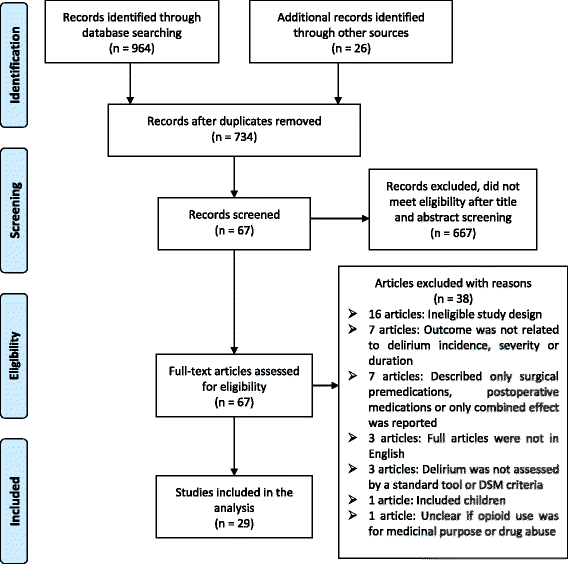Preoperative medication use and postoperative delirium: a systematic review
- PMID: 29284416
- PMCID: PMC5747155
- DOI: 10.1186/s12877-017-0695-x
Preoperative medication use and postoperative delirium: a systematic review
Abstract
Background: Medications are frequently reported as both predisposing factors and inducers of delirium. This review evaluated the available evidence and determined the magnitude of risk of postoperative delirium associated with preoperative medication use.
Methods: A systematic search in Medline and EMBASE was conducted using MeSH terms and keywords for postoperative delirium and medication. Studies which included patients 18 years and older who underwent major surgery were included. The methodological quality of included studies was assessed independently by two authors using the Newcastle-Ottawa quality assessment scale for cohort studies.
Results: Twenty-nine studies; 25 prospective cohort, three retrospective cohort and one post hoc analysis of RCT data were included. Only four specifically aimed to assess medicines as an independent predictor of delirium, all other studies included medicines among a number of potential predictors of delirium. Of the studies specifically testing the association with a medication class, preoperative use of beta-blockers (OR = 2.06[1.18-3.60]) in vascular surgery and benzodiazepines RR 2.10 (1.23-3.59) prior to orthopedic surgery were significant. However, evidence is from single studies only. Where medicines were included as one possible factor among many, hypnotics had a similar risk estimate to the benzodiazepine study, with one significant and one non-significant result. Nifedipine use prior to cardiac surgery was found to be significantly associated with delirium. The non-specific grouping of psychoactive medication use preoperatively was generally higher with an associated two-to-seven-fold higher risk of postoperative delirium, while only two studies included narcotics without other agents, with one significant and one non-significant result.
Conclusions: There was a limited number of high quality studies in the literature quantifying the direct association between preoperative medication use and postsurgical delirium. More studies are required to evaluate the association of specific preoperative medications on the risk of postoperative delirium so that comprehensive guidelines for medicine use prior to surgery can be developed to aid delirium prevention.
Trial registration: This systematic review has been registered on PROSPERO International prospective register of systematic reviews (Registration number: CRD42016051245 ).
Keywords: Adverse drug event; Delirium; Elderly; Medication; Medication related problem; Medication safety; Prevention; Risk factor.
Conflict of interest statement
Authors’ information
GMK is supported by an Australian Government Research Training Program Scholarship. LMKE and TAN are both supported by NHMRC-ARC Dementia Research Development Fellowships (LMKE Grant identification number APP1101788, TAN Grant identification number APP1103860). EER is supported by an NHMRC Senior Principal Research Fellowship (Grant identification number APP1110139). The contents of the published material are solely the responsibility of the individual authors and do not reflect the views of NHMRC.
Ethics approval and consent to participate
Not applicable.
Consent for publication
Not applicable.
Competing interests
The authors declare that they have no competing interests
Publisher’s Note
Springer Nature remains neutral with regard to jurisdictional claims in published maps and institutional affiliations.
Figures
References
-
- Psychotropic Expert Groups: Therapeutic Guidelines:psychotropic, vol. version 7. Melbourne: Therapeutic Guidelines Limited; 2013.
Publication types
MeSH terms
Substances
LinkOut - more resources
Full Text Sources
Other Literature Sources
Medical


